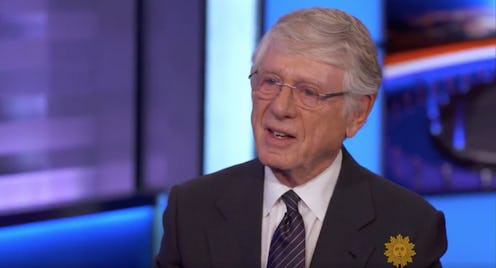News
Ted Koppel Told Sean Hannity He Is Bad For America

In the current political climate, the tension runs high across the aisle. Adding fuel to the fire are TV pundits who tap into the worries of a certain group and exploit that using anger and fear. At Fox News, Sean Hannity has remained a popular figurehead who backed President Donald Trump from the beginning of his campaign and certainly has used the fears of conservatives to further his own talking points. But on Sunday, Hannity got a little truth thrown at him when Ted Koppel told Hannity he is bad for America.
The moment was part of a CBS News Sunday Morning segment on the polarization of America. Part of the conversation between Hannity and Koppel delved into the issue of people's inability to distinguish opinion from fact, and how opinion-based journalism only hurts discourse. Hannity, for his part, thinks the American people totally know how to tell opinion from fact. As the conversation heated up, Hannity asked Koppel if he thought his show was bad for America, and Koppel said yes. He continued:
Koppel: In the long haul I think you and all these opinion shows —
Hannity: Really? That’s sad, Ted. That’s sad.
Koppel: No, you know why? Because you’re very good at what you do, and because you have attracted a significantly more influential —
Hannity: You are selling the American people short.
Koppel: No, let me finish the sentence before you do that.
Hannity: I’m listening. With all due respect. Take the floor.
Koppel: You have attracted people who are determined that ideology is more important than facts.
Koppel accurately identifies the actual problem with opinion shows. When ideology becomes more important than facts, people become cemented in their personal views and are less likely to change their minds.
For some context, Koppel is a veteran news reporter who led CBS's Nightline for 25 years and now contributes special reports to the network. He knows a little about what news programs are like now and what they were like back in the '80s before the Fairness Doctrine was rebuked. In 1987, the FCC decided to reexamine the policy that required a news station to allow airing of opposing views on networks that hold FCC-broadcast licenses.
Since the late '80s shift, programming has become decidedly more polarized, with stations no longer required to discuss one side of a public matter without devoting equal time to the opposing side. So, if you're watching only one left- or right-leaning broadcast network, it's possible to have a very one-sided view of an issue, and you might find yourself more interested in affirming the points that you hear rather than considering all opposing views and facts and making your own decision. This is known as confirmation bias.
Unfortunately, Americans don't have that great of a track record when it comes to placing facts higher than ideology. Various studies have shown that people do not often change their opinions, even when presented with facts that disprove their assertions.
Certainly, Koppel's opinion of ideology over facts isn't limited to the right. The left has its own issues with political pundits who feed into the frenzy of fears and worries over actual facts, too. Both sides truly need to refocus their attention not on condemning the opposing viewpoints, but on actually looking at the facts and determining an appropriate reaction and solution.